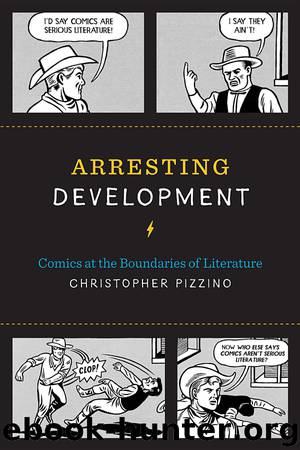Arresting Development: Comics at the Boundaries of Literature by Christopher Pizzino

Author:Christopher Pizzino [Pizzino, Christopher]
Language: eng
Format: epub
Publisher: University of Texas Press
Published: 2016-03-18T04:00:00+00:00
4.1. Alison Bechdel, page 62 of Fun Home, 2006.
This bit of visual slapstick is a joke on readers who may have been momentarily lulled into conceiving of their own reading of Fun Home as essentially “literary,” since they are doing what the soldier reading The Haunt of Fear is doing, not what Bruce is doing. The scene not only suggests a vision of comics reading for pleasure as being more valid than literary reading for the sake of legitimation, but also asserts the specific status of the object that rests in the reader’s hands, and the cultural implications that come with reading a comic book, called by whatever name. To read Fun Home for the literary references, this scene suggests, is not unlike concealing a copy of Playboy behind more respectable reading material (or claiming that one reads it “for the articles”).
At this carefully orchestrated moment, the intricacy and daring of Bechdel’s project becomes fully visible. We are confronted not just with creative self-opposition, insofar as Bechdel attacks the very cultural respectability that Fun Home might seem to court, but with the multivalence of the book’s politics. As discussed in chapter 1, the 1950s were, to put it mildly, a bad time for comics, and this scene offers a glimpse of the history that lies behind the need some critics feel, more than half a century later, to call Fun Home something other than a comic book. Given the stakes of Fun Home’s political project, this observation might seem frivolous. Surely, in a scene where queer desire must be concealed in order to survive an environment of institutionalized homophobia, the point is that the 1950s were a bad time to be gay, in the military as elsewhere. And while it might seem easy to align comics and queerness in this scene, the way Bechdel figures comics does not suggest such an alignment. The soldier holding The Haunt of Fear is doing so openly; his choice of reading matter is much less respectable than Bruce’s in culture at large, but it is not portrayed as something that need be hidden. A few panels later, this comics reader is engaged in playful wrestling with a fellow soldier that looks like a don’t-ask-don’t-tell scenario of barely concealed desire, yet this does not indicate that Bruce’s decision to stay closeted is merely personal (65.1).
In fact, the scene makes clear why the problem of legitimacy associated with comics is a separate horizon of social and political concern that overlaps others, but also differs. As a queer artist publicly discussing her family history, Bechdel possesses a kind of legitimacy that Bruce Bechdel never knew. However, as a cartoonist whose work should have come to widespread public attention long before the publication of Fun Home, and whose reception was limited by her choice of medium as well as her focus on queer life, Bechdel faces her own distinct struggle, with which a literary mind such as Bruce Bechdel’s would probably not have sympathized. And if this struggle
Download
This site does not store any files on its server. We only index and link to content provided by other sites. Please contact the content providers to delete copyright contents if any and email us, we'll remove relevant links or contents immediately.
4 3 2 1: A Novel by Paul Auster(12370)
The handmaid's tale by Margaret Atwood(7752)
Giovanni's Room by James Baldwin(7320)
Asking the Right Questions: A Guide to Critical Thinking by M. Neil Browne & Stuart M. Keeley(5757)
Big Magic: Creative Living Beyond Fear by Elizabeth Gilbert(5753)
Ego Is the Enemy by Ryan Holiday(5412)
The Body: A Guide for Occupants by Bill Bryson(5079)
On Writing A Memoir of the Craft by Stephen King(4927)
Ken Follett - World without end by Ken Follett(4720)
Adulting by Kelly Williams Brown(4564)
Bluets by Maggie Nelson(4546)
Eat That Frog! by Brian Tracy(4522)
Guilty Pleasures by Laurell K Hamilton(4439)
The Poetry of Pablo Neruda by Pablo Neruda(4093)
Alive: The Story of the Andes Survivors by Piers Paul Read(4017)
White Noise - A Novel by Don DeLillo(4001)
Fingerprints of the Gods by Graham Hancock(3991)
The Book of Joy by Dalai Lama(3972)
The Bookshop by Penelope Fitzgerald(3843)
